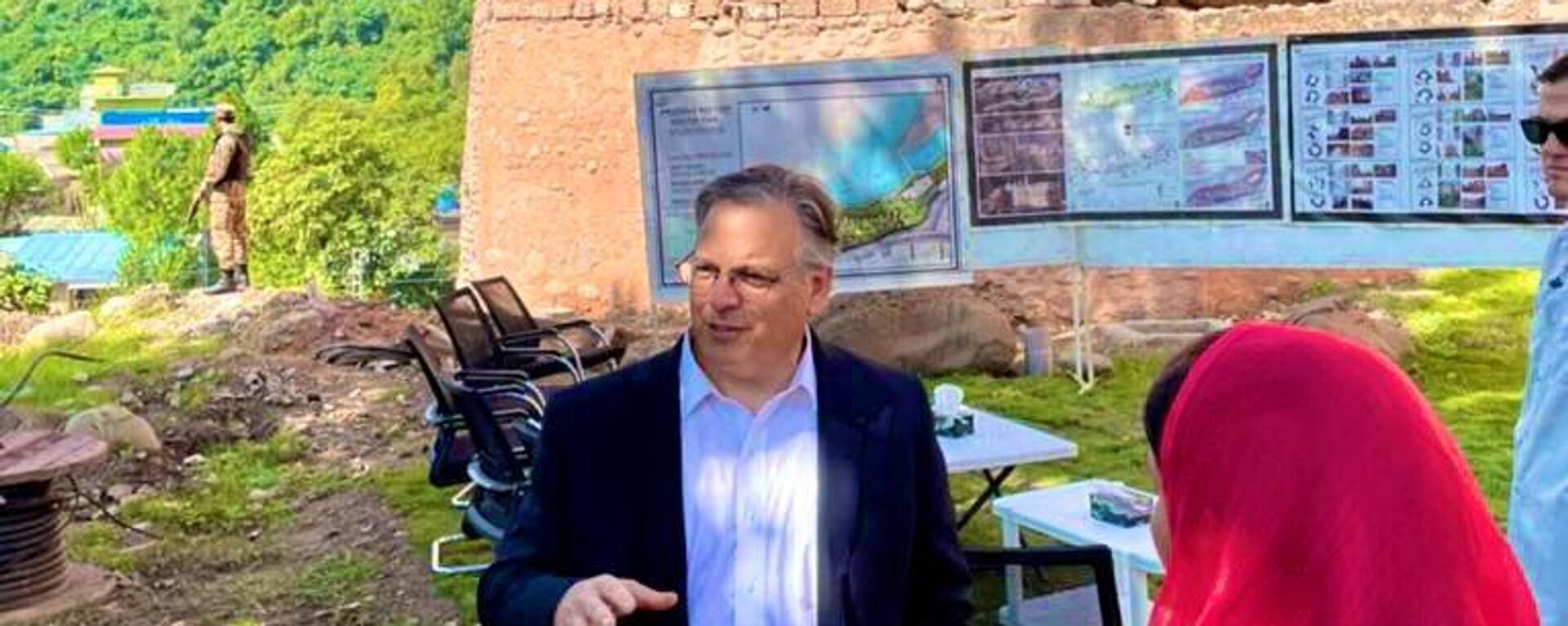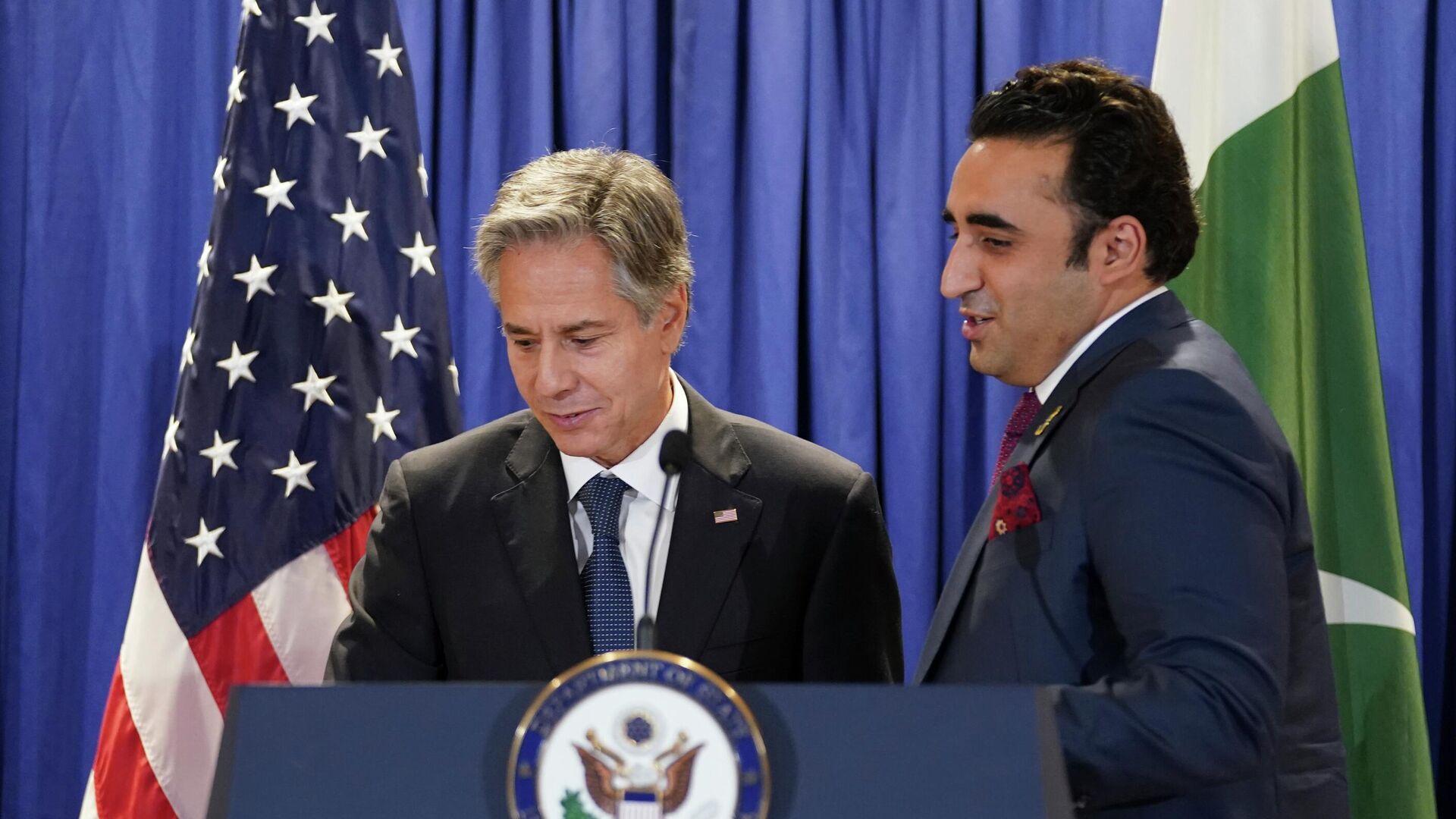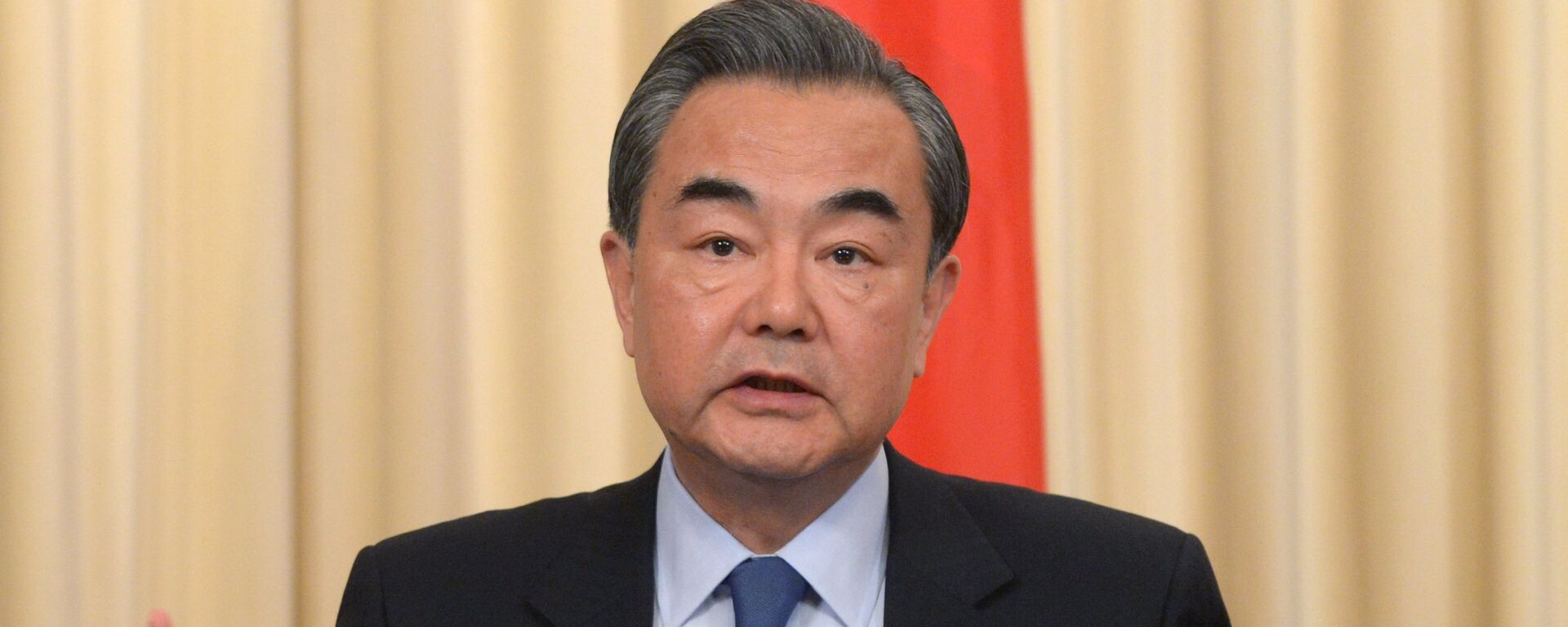https://sputnikglobe.com/20221007/just-interested-in-selling-weapons-to-india-ex-envoy-on-us-enhancing-ties-with-pakistan-1101607560.html
‘Just Interested in Selling Weapons to India’: Ex-Envoy on US Enhancing Ties With Pakistan
‘Just Interested in Selling Weapons to India’: Ex-Envoy on US Enhancing Ties With Pakistan
Sputnik International
The US has increased its defense supplies to India from zero in 2008 to almost $20 billion in 2020, as Washington seeks to replace Russia as India's top arms... 07.10.2022, Sputnik International
2022-10-07T13:58+0000
2022-10-07T13:58+0000
2022-12-08T18:02+0000
india
us
terrorism
taliban
cold war
russia
narendra modi
pakistan
https://cdn1.img.sputnikglobe.com/img/07e6/0a/07/1101611304_0:0:2823:1589_1920x0_80_0_0_32068c2356cce2b4bd410eaf6850a976.jpg
Indian Foreign Minister S Jaishankar previously objected to the US decision to supply Pakistan with spare parts for Islamabad’s F-16 fighter jet fleet, indicating that these jets are mostly used at the India border rather than for the stated purpose of being deployed in counter-terrorism operations.Meanwhile, Pakistan’s Foreign Minister Bilawal Bhutto Zardari recently paid a 2nd visit to Washington since the new government in Islamabad came to power in April. This week, Pakistan’s Chief of Army Staff (COAS) General Qamar Javed Bajwa also paid an official visit to the US and held talks with Defense Secretary Lloyd Austin.In an interview with Sputnik, a former Indian diplomat has criticized the Biden administration for overlooking India’s concerns regarding terrorism amid an upswing in defense and political ties between the US and Pakistan in recent months.Ahmad suggested that strong US-Pakistan military ties are meant to serve as a “gentle reminder” to India because of New Delhi’s neutral stand on the Ukraine crisis.India has not only rebuffed US and other western allies in not voting against Russia at the United Nations (UN), but has scaled up its energy ties with Moscow this year in view of high global crude prices.Ahmad said that there has “never been a break in US-Pakistan relations”, although the US cut off its military aid to Pakistan in 2018 amid concerns that Islamabad was secretly supporting the Taliban* against the US-backed government in Kabul, which was overthrown last August.“US-Pakistan relations hardly depend upon the political leadership at the White House or in Islamabad. These relations go back to the early days of the Cold War and have been sustained year after year by contacts between the militaries and the intelligence agencies of the two countries,” said the ex-diplomat.“Towards the end of World War II, there was perfect clarity in the United Kingdom that a permanent ally in the region would sustain Western interests not only in south Asia but also in western and central Asia. And if one looks at it objectively, this is exactly what Pakistan has done during most of its post-independent history,” said Ahmad, as he pointed out Islamabad’s membership of the US-led South East Asian Treaty Organization (SEATO) during the Cold War and its status as a major non-NATO ally during the so-called War on Terror.Ahmad said that maintaining close ties with Pakistan is a “failure of American foreign policy.”“This is a failure of American foreign policy. The US has consistently failed to manage relationships with complex regions lying outside the Americas,” he added.Impact on India-US RelationsThe ex-Ambassador also stated that reservations in India on close Pakistan-US ties are nothing new and have surfaced from time to time.He argued that the Indian government was already on “course correction” since last year, as far as its involvement in the US’ Indo-Pacific Strategy is concerned.Ahmad reckoned that the “resurgence” in India-US ties during the initial years of the Modi government, which first came to power in 2014, were primarily centered on American interests.Ahmad said that the revival of the Quad grouping in 2017 was an American ploy to “pull India away from its strategic autonomy towards a US-led security architecture.” The first foreign ministers’ meeting of India, US, Japan and Australia took place in September 2019.“I would suggest that Beijing saw this elevation of Quad to a foreign ministerial meeting as an abandonment of India’s strategic autonomy. The Quad, at the time, was primarily viewed as a security group meant to serve the US’ cause in the region, particularly an alliance against China,” he said.Ahmad said that the Chinese PLA “moved troops to the Ladakh border region in April 2020 to remind India that its interests lie not in the South China Sea but at the undermarketed Sino-India land border.”* under UN sanctions over terrorist activities
https://sputnikglobe.com/20221003/official-position-us-envoy-under-fire-for-referring-to-pakistan-administered-kashmir-as-azad-jk-1101458206.html
https://sputnikglobe.com/20220522/chinese-top-diplomat-says-us-indo-pacific-strategy-undermines-peace-bound-to-fail-1095704253.html
russia
pakistan
Sputnik International
feedback@sputniknews.com
+74956456601
MIA „Rosiya Segodnya“
2022
News
en_EN
Sputnik International
feedback@sputniknews.com
+74956456601
MIA „Rosiya Segodnya“
Sputnik International
feedback@sputniknews.com
+74956456601
MIA „Rosiya Segodnya“
india, us, terrorism, taliban, cold war, russia, narendra modi, pakistan
india, us, terrorism, taliban, cold war, russia, narendra modi, pakistan
‘Just Interested in Selling Weapons to India’: Ex-Envoy on US Enhancing Ties With Pakistan
13:58 GMT 07.10.2022 (Updated: 18:02 GMT 08.12.2022) Exclusive
The US has increased its defense supplies to India from zero in 2008 to almost $20 billion in 2020, as Washington seeks to replace Russia as India's top arms supplier. The US also designated India as a "major defense partner" in 2016. The Pentagon said this week that ties between the two nations are on "right track".
Indian Foreign Minister S Jaishankar previously objected to the US decision to supply Pakistan with spare parts for Islamabad’s F-16 fighter jet fleet, indicating that these jets are mostly used at the India border rather than for the stated purpose of being deployed in counter-terrorism operations.
Meanwhile, Pakistan’s Foreign Minister Bilawal Bhutto Zardari recently paid a 2nd visit to Washington since the new government in Islamabad came to power in April. This week, Pakistan’s Chief of Army Staff (COAS) General Qamar Javed Bajwa also paid an official visit to the US and held talks with Defense Secretary Lloyd Austin.
In an interview with Sputnik, a former Indian diplomat has criticized the Biden administration for overlooking India’s concerns regarding terrorism amid an upswing in defense and political ties between the US and Pakistan in recent months.
“The US is just interested in selling weapons to India,” remarked Talmiz Ahmad, India’s former Ambassador to Saudi Arabia and the UAE and an expert in political Islam, while the Biden administration also wants to keep Delhi under “sustained pressure” by maintaining ties with Islamabad.
Ahmad suggested that strong US-Pakistan military ties are meant to serve as a “gentle reminder” to India because of New Delhi’s neutral stand on the Ukraine crisis.
“The US has in a way conveyed to India that its ties with Pakistan continue to remain intact, with a particularly strong military component. This is the price countries have to pay for maintaining strategic autonomy,” said Ahmad.
India has not only rebuffed US and other western allies in not voting against Russia at the United Nations (UN), but has scaled up its energy ties with Moscow this year in view of high global crude prices.
Ahmad said that there has “never been a break in US-Pakistan relations”, although the US cut off its military aid to Pakistan in 2018 amid concerns that Islamabad was
secretly supporting the Taliban* against the US-backed government in Kabul, which was overthrown last August.
“US-Pakistan relations hardly depend upon the political leadership at the White House or in Islamabad. These relations go back to the early days of the Cold War and have been sustained year after year by contacts between the militaries and the intelligence agencies of the two countries,” said the ex-diplomat.
He went on to argue that the decision to carve out Pakistan from the Indian subcontinent in 1947 was a strategic move meant to ensure that the Western powers always have a “permanent ally” in the region.

3 October 2022, 11:47 GMT
“Towards the end of World War II, there was perfect clarity in the United Kingdom that a permanent ally in the region would sustain Western interests not only in south Asia but also in western and central Asia. And if one looks at it objectively, this is exactly what Pakistan has done during most of its post-independent history,” said Ahmad, as he pointed out Islamabad’s membership of the US-led South East Asian Treaty Organization (SEATO) during the Cold War and its status as a major non-NATO ally during the so-called War on Terror.
Ahmad said that maintaining close ties with Pakistan is a “failure of American foreign policy.”
“The US is overlooking that Pakistan has also been deeply involved with its ‘all-weather’ friend China for several decades. Despite that, it poured billions of dollars to upgrade Pakistan’s military capabilities,” noted Ahmad.
“This is a failure of American foreign policy. The US has consistently failed to manage relationships with complex regions lying outside the Americas,” he added.
Impact on India-US Relations
The ex-Ambassador also stated that reservations in India on close Pakistan-US ties are nothing new and have surfaced from time to time.
He argued that the Indian government was already on “course correction” since last year, as far as its involvement in the US’ Indo-Pacific Strategy is concerned.
“There was a short period in the early days of the Modi government when India appeared to be moving very rapidly towards the Americans. This growing proximity between India and the US sort of stalled as India remained insistent that the US must officially designate Pakistan as a state sponsor of terrorism,” remarked Ahmad, adding that the US has never been able to agree to New Delhi’s demand.
Ahmad reckoned that the “resurgence” in India-US ties during the initial years of the Modi government, which first came to power in 2014, were primarily centered on American interests.
“The US wanted to enter into a confrontation with China in the western Pacific region. So they constructed an artificial geographical concept of Indo-Pacific, which was done with the motive of pulling India into this space,” he stated.
Ahmad said that the revival of the Quad grouping in 2017 was an American ploy to “pull India away from its strategic autonomy towards a US-led security architecture.” The first foreign ministers’ meeting of India, US, Japan and Australia took place in September 2019.
“I would suggest that Beijing saw this elevation of Quad to a foreign ministerial meeting as an abandonment of India’s strategic autonomy. The Quad, at the time, was primarily viewed as a security group meant to serve the US’ cause in the region, particularly an alliance against China,” he said.
Ahmad said that the Chinese PLA “
moved troops to the Ladakh border region in April 2020 to remind India that its interests lie not in the South China Sea but at the undermarketed Sino-India land border.”
“I believe that India was on a course correction in 2021,” he said, adding that India’s stand during the Ukraine crisis has firmly reaffirmed its policy of “strategic autonomy.”
* under UN sanctions over terrorist activities





